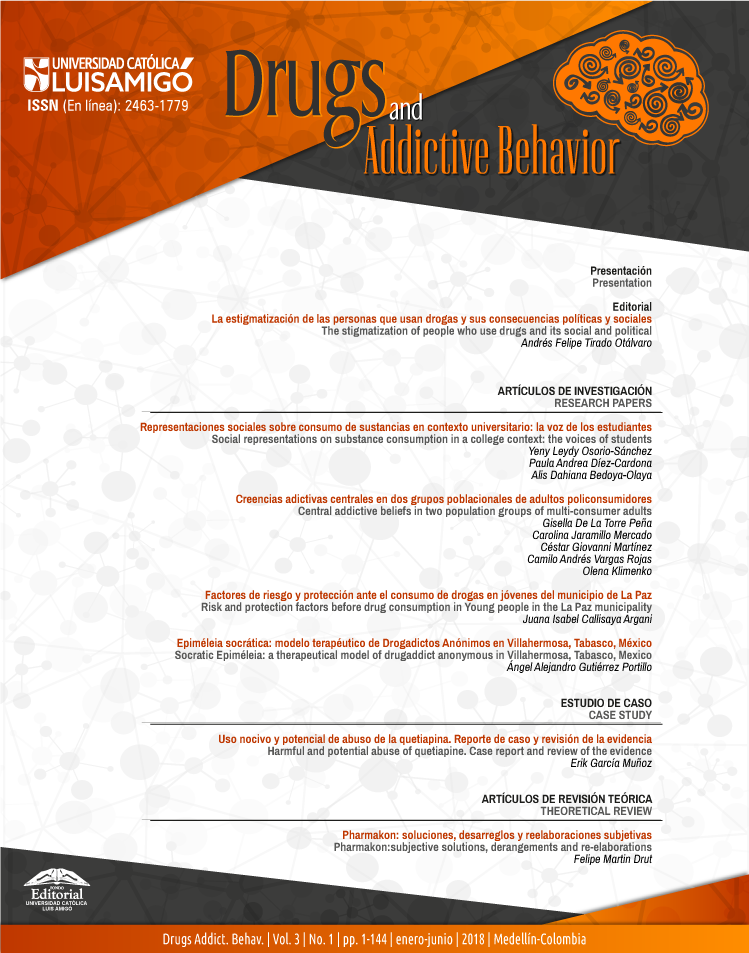The stigmatization of people who use drugs and its social and political consequences
DOI:
https://doi.org/10.21501/24631779.2631Keywords:
Addictions, Prevention, Treatment, Rehabilitation, Social reintegrationAbstract
Drug use is a social and cultural complex phenomenon, which cannot be limited to interaction of biological, situational, judicial or environmental variables, that favor the risk of addiction or delinquency; that is why, the state intervention ought to go beyond the sanitary medical model, as well as the punitive judicial model, in order to provide macro-structural to the complexity of the situation. Such measures should guarantee education, dignified jobs, recreation, housing and other social benefits that people who use drugs have rights to, as citizens who are equal before the law, in equity and democracy.
Downloads
References
Goffman, E. (1970). Estigma e identidad social. En Estigma: la identidad deteriorada (10a ed., pp. 11-55). Buenos Aires: Amorrortu.
Link, B. G., & Phelan, J. C. (2001). Conceptualizing stigma. Annual Review of Sociology, 27, 363–385. Recuperado de http://www.annualreviews.org/doi/abs/10.1146/annurev.soc.27.1.363 https://doi.org/10.1146/annurev.soc.27.1.363
Downloads
Published
How to Cite
Issue
Section
License
INTELLECTUAL PROPERTY
The authors are morally and legally responsible for the content of their articles, as well as respect for copyright. Therefore, these do not compromise in any way the Luis Amigó University Foundation.
The reproduction of the articles will be governed as described in http://creativecommons.org/
PUBLICATIONS POLICY
• The author must send the statement of assignment of economic rights and the declaration of conflicts of interest in favor of the journal. Said document will be provided by the Editor and indicates the originality of the article, which is not published and which is not simultaneously postulated in another medium.
• The address of the journal Drugs and Addictive Behavior will confirm to the author, in a maximum of three (3) days, the reception of the received contribution, if its sending is done through the electronic mail; or immediately, if it is entered through the OJS (Open Journal Systems). The reception of articles does not imply an obligation to publish them.
• The journal Drugs and Addictive Behavior will submit the articles received for initial evaluation by the Editorial Committee; In case the Committee finds the material relevant, it will be evaluated by anonymous arbitrators, who will determine if it is publishable.
• Once the evaluation of the article has begun, the authors agree not to remove it in any part of the process.
• Printed items will not be received. All the proponents will have to send their writings through the e-mail of the magazine or the OJS.
• Partial versions of the text will not be received, that is, those that the author considers to modify and that are not structurally adjusted to a type of article.
• Once the article is sent, it is understood that the author authorizes the publication of their contact information and institutional affiliation.
• The authors are directly responsible for the ideas, judgments and opinions expressed in the articles; in such a way that the content does not compromise the thinking of the Editorial Committee or the Institution.
ETHICS OF PUBLICATION
• The Editorial Committee, by virtue of transparency in the processes, will ensure the academic quality of the journal.
• Causes of rejection are considered: plagiarism and self-plagiarism, adulteration, invention or falsification of content and author data, and that the article is not original and unpublished.
• The editor will verify the relevance of the article, in accordance with the policies of the journal and supported by Turnitin's Originality Check, software that detects errors in the handling of appointments, possible copies and plagiarism. If it considers it viable, it will send the article to the arbitrators; otherwise it will report the findings to the author and discard it. The articles must have a minimum originality level of 75%.
• In no case, the journal's management will require the author to cite it or publish articles with conflicts of interest.
• If once the article is published: 1) the publisher discovers plagiarism, adulteration, invention or falsification of data of the content and the author or substantive errors that attempt against the quality or scientificity, may request its removal or correction. 2) A third party detects the error, it is the obligation of the author to retract immediately and proceed to the public removal or correction.
• The opinions contained in the articles are attributable exclusively to the authors; therefore, the Institution is not responsible for what they may generate.


